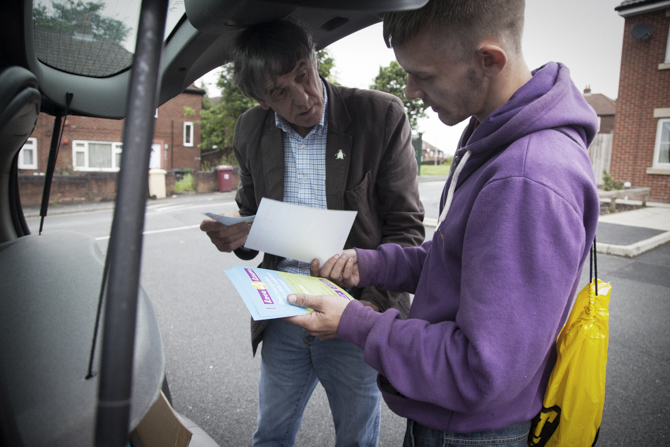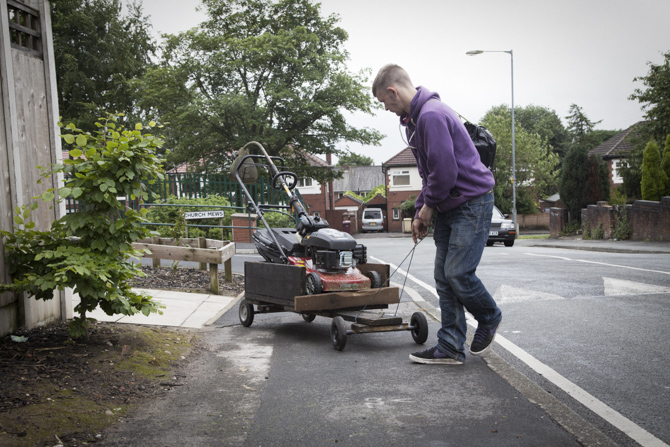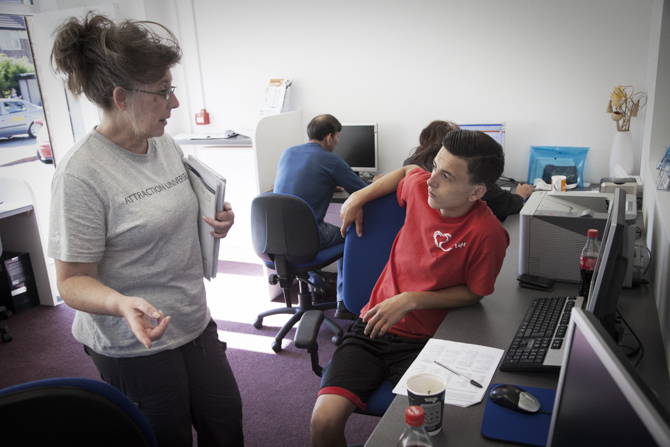“I’m fed up working for a few pennies here and there, trying to make a tenner to help us through the week. I want to be making enough to take out a mortgage on a house. I could go out and get a job tomorrow, but I don’t want a job, I want a career.”
Chris is 25 next week and has been making money from cutting other people’s grass for the last ten years, on and off.
“At 15 I’d wander round with my strimmer, trying to make a few quid.”
Now, for the first time, he’s got some support and is about to make a step change in his business.

Born in Scotland and living in Bolton since he was nine, things haven’t always gone well for Chris.
He moved houses and schools a fair bit when he was younger. “I was a naughty child,” he admits, “a bit rude. I got kicked out of one school and then another.” He ended up at a pupil referral unit from where he got an English and maths GCSE and some IT qualification.
“When I was 15 I got kicked out of my mum’s and moved in with my auntie, which didn’t go well. I started sofa-surfing and for six months lived down there” – he waves his arm in the direction of town – “in a tent. When I was 17 I got my own place, found a job but blew all my money and ended up with massive debts.”
Things seem to settle down for Chris when he met his girlfriend. They now have a six- and four-year-old. “So things are on the up?” I ask
“Yeah, they are.”
Chris, Mick and I are sitting in the middle of Vanessa’s upstairs office. The UCAN is so busy today there just isn’t another available space. “I love it when we’re running at capacity,” says Vanessa before she leaves us to it and heads next door for some high-level meeting.
Retired policeman Mick works for Bright Direction Training, set up a few years ago by Jamie MacGregor, an entrepreneur who started out studying criminology.
“I retired from the cops after 32 years, decorated my house five times, got bored, decided to go back to work so went back to school and got a teaching degree.
“I’m 63 now,” says Mick “and Jamie is 31. When people see us together they think he works for me, but it’s the other way round. We do a lot of employability training and run courses on leadership management, that sort of thing.”
“And how long have you been helping Chris for now?” I ask.
“Only for the last couple of months although the funding means we’re able to help for up to 12 months,” he say, “We’ve bought him a lawnmower. How can you be a landscape gardener if you haven’t got a lawnmower? One of the major difficulties of self-employment with someone like Chris is that you might be willing and able, you might have a lot of drive and energy but he has no working capital, none whatsoever. And if you’re on benefits, then how can you access any sort of tools or equipment?”
“They’re not available to you,” concurs Chris. “They’re really not available to you.”
“And there doesn’t seem to be any route into that,” continues Mick. “Some people can access some pots of funding but Chris doesn’t fit the profile for any of those and this is where this Warburtons funding can be very useful.”
Although arranged through Bolton at Home I know that the support Chris gets from Bright Direction is actually funded by Warburtons, the family-owned bakers based in Bolton, so I ask Mick how that works...
… continued in… Building blocks of legitimacy
….continued from “I don’t want a job, I want a career.”
“Warburtons, as far as I know, have always been interested in supporting the community that sustains them, so to speak. In Bolton, in particular. They’ve been heavily involved with Bolton Wanderers over the years and have done lots and lots of social enterprise-type projects. My understanding is they have pockets of funding they’re prepared to invest across their communities,” says Mick.
“The idea for our project is to support some Bolton at Home clients through this self-employment project. So we’re working with about 10 local people who might have been long-term unemployed or have some other barriers that stop them moving on.
“Warburtons are not looking for massive outcomes, and they’re not expecting all 10 people to suddenly become self-employed and self-sufficient. What they are looking for is the journey, for these individuals to make some progress.”
“They’re being realistic about what can reasonably be achieved,” I suggest.
“Very much so,” says Mick, “and Chris, at the moment, is a roaring success.”
“So, how does it work?” I ask Chris, “Are you still on benefits?”
“Yes,” he says, “but that’s because I work for less than 16 hours a week. A lot less. I have to declare each week to the JobCentre advisor how much I have worked in case it affects my money.”
“We’re trying to gradually move people like Chris into self-employment so they can eventually come off benefits,” explains Mick. “It’s Catch-22, the lad’s got the get up and go to find the work but doesn’t earn enough to support himself.
“We’re putting in place what I call the building blocks of legitimacy, so he’s got a firm footing from which to build his business. We’ve sorted him out with insurance, got a load of leaflets printed – they’re in the boot of my car, Chris, I’ll give them to you later – bought him tools, with the hope he can build a client base that will sustain him over the winter.”
“There’s always plenty to do in the winter,” says Chris.

“And who, typically are your customers?” I ask.
“Households mainly,” he says, “and some businesses. Having insurance will be a big help with the businesses. Schools and churches won’t let you near the place unless you’ve got public liability insurance. But I mostly try the posh houses, with big gardens.”
“But where?” I ask, knowing there aren’t that many posh houses in Breightmet.
“Some round here,” says Chris, “but I will go further afield.”
“Tell him how you get your equipment around,” says Mick.
“I pull it along on a little box cart I’ve made because I don’t want to ruin the lawnmower, it’s only got plastic wheels. Sometimes I’ll go as far as Farnworth.”
I’m not familiar with the distances. “How far is that?” I ask.
“About four or five miles. It would take me about an hour and a half walking there and back.”

“And how much do you charge? What’s your hourly rate?”
“For my regular clients it’s £5 an hour, but generally it’s £7.50, but if I’m going that far, I’ll try and get a day’s work to make it worth my while.”
“Chris finds pricing difficult,” says Mick.
“That’s when I talk to these guys. They can help me out with all those gaps I’m missing. Sometimes I just ring them up and ask them random questions. It’s good to have someone to talk to, and if they don’t know the answers they’ll go out of their way to find them for me.”
“I haven’t told you this yet,” Mick says to Chris, “but I have a pal who lives near me and he’s a landscape gardener. He started off much the same way as you’re doing and now he has four or five people working for him. He’s doing all right. Anyway, he’s agreed to talk to you and give you some advice about the next steps.”
Chris smiles and nods his approval.
Got a garden within cart-dragging distance of Breightmet? Love 4 Lawns is on 07808 151 390
I catch Vanessa and Carl in discussion upstairs, nothing formal, just another of their ‘quick catch-ups’ where the events of the previous day are shared in between them rushing to one meeting or another.
“We’ll have to look at doing a piece of work around that,” Vanessa is saying. And that’s the UCAN in a nutshell. From the frontline Carl and Rosanne feedback residents’ concerns, hot topics from the estate and, as a neighbourhood team, they decide to respond with ‘a piece of work’.
Over the last few months they’ve looked at environmental problems on the estate; supported ex-incapacity benefit claimants and hosted group sessions around debt. They’ve staged ESOL classes; cookery courses for blokes and set up a secondhand clothes shop. They’ve… well, let’s just say it’s a long list.
“There’s a big issue at the moment with cannabis use,” Vanessa tells me, “and it’s not just with the teenagers.”
I can believe it. The vision of a hooded teenager whizzing past me on a scooter a few weeks back is still with me, as is the distinctive whiff he left in his wake. But illegal smoking? Surely there are some problems that are just too big.
“Come on Vanessa, you can’t tackle everything,” I say, before thinking.
Vanessa is straight back at me. “Why not?” she says with bemusement. “Why can’t we?”
And there it is. Although I was more concerned they were taking on more than they could manage, I’d inadvertently challenged the whole ethos of the UCAN. If it’s a problem on the estate, or a concern for residents – health, employment, debt – then why not? Have I learnt nothing?
This is potentially my last story from Breightmet. It’s been nearly twelve months since I got off the wrong bus and walked through the estate, contemplating what I was getting myself into.
Downstairs the scene this morning is not too dissimilar to that of a year ago: residents in front of computer screens, working towards something better.
Dillon and Callum are here, both sporting their Heartlift T-shirts and trendy haircuts. “Don’t they look smart,” says June, looking up from the Universal JobMatch website.
Cath – the UCAN’s freelance employment advisor – is here too, helping the young men write their CVs.
“These two are the next apprentices on the Mojo Trust scheme,” she says, proudly. “They’ll be doing all the horticulture stuff that Sean and Steven have been doing.”

“So, does your team play in a local league,” she says to Dillon.
“Sunday league,” he replies.
“That’s great. Much better than just saying ‘I play football’. Membership of groups and teams shows commitment. An employer is going to be more interested in you if you can show you’ve stuck at something.”
Another lad wanders in through the open door, coming to see what his mates are up to. “Hello chick,” says Cath.
And bingo! Here it is. Exactly what that ‘piece of work’ around the football was all about. What was it Carl said at the time?
They’re on to writing a list of skills now. “With the volunteering you’ve already done, think of all the skills you’ve already got,” says Cath. She’s buoying them up now, making the link between the volunteering roles they’ve had and how they convert to sought-after job skills.
She’s enjoying herself too. “It’s a joy to see you lads in here,” she says, genuinely.
And it’s a joy to watch. It’s as if what I’m witnessing this morning has been laid on to encapsulate the UCAN philosophy: compassionate, dedicated staff giving tailored support to individual residents.
In public sector service delivery this straightforward approach seems as rare as rubies.
Postscript: my thanks to the residents of Breightmet who have told me their stories. And to the Bolton at Home staff who have welcomed me into their workplace as if one of their team. Special appreciation is also due to Vanessa McDermott who, before her maternity leave, set the As Rare as Rubies wheels in motion. Thanks Vanessa.




